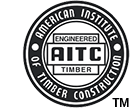
In addition to providing lumber grading and inspection services to member mills and subscribers on an ongoing basis, PLIB also offers services for those who need an inspection, quality marking, or certification service on a one-time or infrequent basis.
This as-needed inspection service, also known as transient inspection service, is typically used by:
- Portable sawmill operators
- Fixed location mills who saw structural softwood lumber on an infrequent basis
- Small woodlot owners who use their own lumber for construction projects that require building code approval
- Contractors who receive lumber shipments with no grade stamps
- Contractors, builders, and engineers who need installed lumber inspected
- Wood packaging facilities that ship internationally on an infrequent basis
- Parts and equipment manufacturers who occasionally ship overseas
Most on-demand grading services are available throughout the regions PLIB serves.
Costs for this service will depend on the amount of time the inspection takes and the distance the inspector has to travel. Hourly and daily rates are available.
For more information on transient inspection services or to get an estimate, call us at 253.835.3344 (U.S.) or 604.732.1782 (Canada) or contact us via email.
- Not everyone realizes that most building codes require that lumber used in structural applications must carry a grade stamp from an American Lumber Standard Committee (U.S.) or Canadian Lumber Standard Accreditation Board (Canada) accredited grading agency or equivalent. It is far less costly to have the lumber inspected and grade stamped at the time of manufacture or prior to installation than it is to install non-stamped lumber and then have the project “red-tagged” by the building inspector and be required to remove it for not having a proper stamp.
- An older building is being remodeled and the process has uncovered non-stamped lumber and/or timbers. The engineer or architect calls for a “material-in-structure” transient inspection because they need to know the grade of lumber that is installed to determine whether it meets the structural requirements of the new design.
- A manufacturer or shipper may be unfamiliar with import requirements of foreign countries and may not be aware of ISPM 15 regulations and the need for IPPC marks on wood packaging.
- A manufacturer may ship internationally on an infrequent basis and not need ongoing IPPC marking service.
Lumber Grading
There are two types of on-demand lumber grade inspections:
- Grade stamp / Certificate of Inspection and
- Material-In-Structure inspection.
Lumber that is not installed in a structure can be inspected on-site at any location using our Grade Stamp / Certificate of Inspection on-demand inspection service. Our inspectors will inspect and determine the grade of each piece of lumber according to the applicable grade rules. Each piece will be grade stamped or, if the lumber is going to be exposed and the appearance of a stamp would be detrimental, a Certificate of Inspection will be issued that will list the grade(s) and tally.
Lumber that is already installed in a structure cannot be grade stamped or certified according to the regulations of our accrediting bodies because not all surfaces and ends are visible. In such cases, our inspectors will inspect the installed lumber and a report will be issued that will identify the grade quality of the lumber. Typically these reports are provided to building code officials, architects, and engineers to assist them in making decisions on the suitability of the lumber for the project. We recommend checking with your building department to confirm they accept “material-in-structure” reports.
ISPM 15 Wood Packaging
On-demand inspections for ISPM 15 wood-packaging require advance planning and discussion with PLIB prior to the inspection so that the right lumber can be purchased and used in the wood packaging and the correct documentation is available. For these reasons, we ask that you contact us prior to making the packaging so that our inspection staff can guide you through the process. At the final inspection, PLIB inspectors will review your documentation, verify the lumber components are properly stamped and apply the IPPC mark to all conforming wood packaging.



